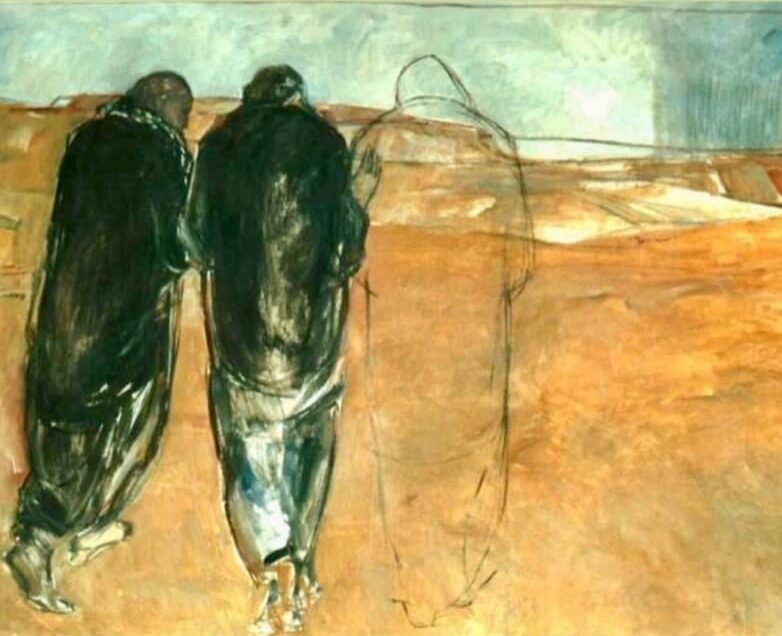A Journey of Revelation
On the other side of Easter, we find ourselves on the Emmaus Road. We get to walk the seven miles from Jerusalem to Emmaus with two disciples who are anything but joyful. Rather, they are downcast, defeated, discouraged, perhaps even feeling betrayed in the midst of their confusion, sorrow, and grief. Jesus is dead. Jesus was crucified. Jesus will never be present again to speak, teach, console, heal, and love them. Hope was shattered for these two who had pinned their hope on Jesus as the Messiah. The long-awaited one they believed was sent from God to redeem Israel and set the world right once again.
I’ve never walked that dusty road, but I know Emmaus—the experience of disappointment and unanswered questions. Like you, I have lived in the darkness of what feels like the absence of the living God. I have lived focused, not on hope or Jesus’ declaration about the future, but focused instead on my own emotional sense of loss and disappointment.
What if Jesus is not who he said he was?
What if we just simply got it wrong because our expectations were so important to us?
What if our dreams for the Kingdom of God, present in our world, are simply misguided, and now we are left with the grave clothes of a defeated dream?
The dusty road

Read the text in Luke 24 or keep it nearby; you might be surprised by what you find.
Jesus came near and began to walk with them, engaging in conversation. Why they couldn’t recognize him, I can’t say, but I know my own blindness to Jesus’ presence all too often in my life. Consumed by my questions, longing for complete and total certainty instead of the courage of faith, our spiritual eyes can remain blind.
I wonder about the tone of the question from Cleopas: “Are you the only stranger in Jerusalem who does not know the things that have taken place there in these days?”[1] Incredulous with this stranger now walking alongside them, they confess, “…we had hoped that he was the one to redeem Israel”.[2] You needn’t be an academic scholar to catch their drift: we got it wrong!
Although…
Although… Some of the women in our group astounded us with a report of angels at the tomb, but the men (read: the trustworthy authorities) “did not see him”.[3]
And Jesus lets them have it: “you are foolish and slow of heart to believe…didn’t you listen to him when he talked of Moses, the prophets and his suffering?”[4] I would like to ask these two if they were offended by such strong words but later they would say, “Were not our hearts burning within us, while he was talking to us on the road, while he was opening the scriptures to us?”[5]
How much we long to have Jesus walk alongside us, speak to us, and teach us scripture. I have prayed that way since my earliest years. “Show yourself to me, please, reveal yourself so that I might know you.” How blind I am so often to the identity of the one who is, in fact, present as I read scripture and at the table in the breaking of bread. Scripture and sacrament: Jesus is present when we are immersed in scripture and in our fellowship with other believers in worship and the Lord’s Supper.
At least the two paid attention as their hearts were ablaze within. They recognized the one who had been present in their midst, having walked seven miles to their home. At a steady pace, you can walk seven miles in about two and a half hours. But recognition came only after they listened to him interpret scripture and celebrated the meal they had eaten with him before. Hearts ablaze now, light within as they knew Jesus was not as they feared, dead and buried, but alive, walking with them, still interpreting scripture, and always inviting them to the table.
The Moment of Revelation
They were so overwhelmed with joy that they hurried back to Jerusalem to share the good news with the other disciples. Once again, they became what they were before this moment of revelation: witnesses of Christ’s resurrection and His presence in our lives.
When we encounter Christ, our natural response should be to share the experience with others. The Emmaus road journey was not just about these two disciples—it was about preparing them to witness to others. We, too, are called to be witnesses of Christ’s resurrection and His presence in our lives.
Practice:
Be honest as you write in your journal today.
- At what point(s) in the story do you most identify with the two travelers on their journey home?
- Is your faith more reflected as theirs was before the moment of recognition, in the moment of burning hearts, or when their eyes, ears, and hearts opened to revel in the presence of our living Lord?
- Write as long as you need, then find another follower of Jesus and worship: “He is risen—He is risen indeed!”
_______________________________

Keith Anderson, D.Min., is a Faculty Associate for Spirituality and Vocation at VantagePoint3 and President Emeritus of Seattle School of Theology and Psychology and is the author of several books, including Reading Your Life’s Story (IVP, 2016), A Spirituality of Listening (IVP, 2016), and Spiritual Mentoring (IVP, 1999). Keith’s newest book, On Holy Ground: Your Story of Identity, Belonging and Sacred Purpose, will soon be released from Wipf & Stock Publishers. In his writing, teaching, and mentoring, Keith seeks to set a table for people looking to enter the “amazing inner sanctuary of the soul” in the most ordinary and extraordinary moments of life.
[1] Luke 24:18
[2] Luke 24:21
[3] Luke 24:24
[4] Luke 24:25-27
[5] Luke 24:32

